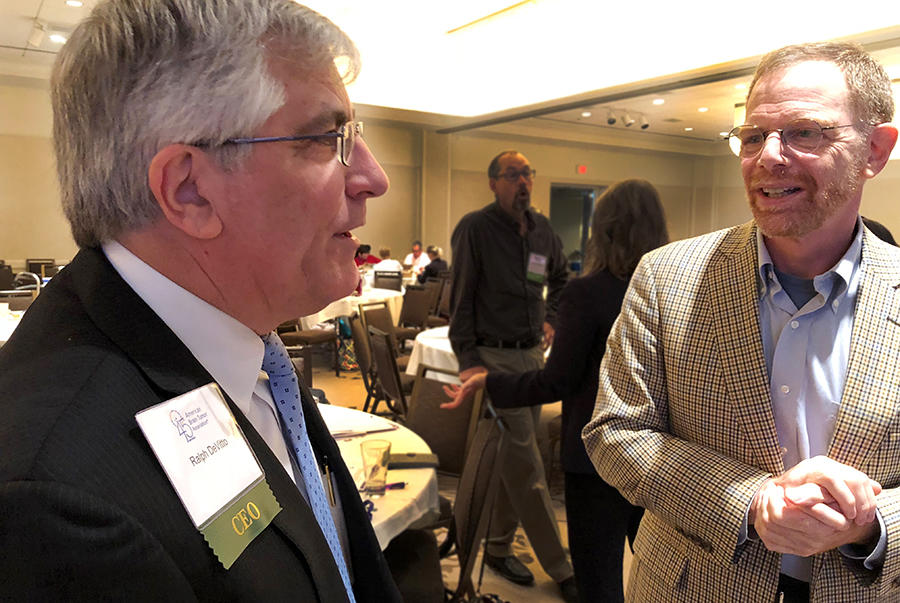Furthering 46 Years of Brain Tumor Patient Education and Support
, by Brittany Cordeiro, NCI-CONNECT Program Manager
Read how the first national advocacy organization for brain tumor education and information is expanding its services and collaborating to improve care and treatment.
In 1973, two mothers connected for a reason they never imagined: to start a foundation in honor of their daughters with brain tumors. Micki Rae, age 6, and Stephanie, age 7, both passed away within two years of their diagnosis. But the foundation the two mothers started, the American Brain Tumor Association (ABTA), has thrived for nearly 46 years.
Ralph DeVitto is the president and chief executive officer of ABTA. He joined ABTA in February 2018 from the American Cancer Society.
We have an important mission to advance the understanding and treatment of brain tumors with the goal to extend and save lives.
“I see people that face a generally lethal disease with few resources and improvements in treatments compared to other cancers,” says DeVitto. He aims to lead the organization to have a stronger voice for the patient by raising more awareness and funds.
To this end, ABTA is enhancing its educational and support services. It hopes to provide more information for patients, caregivers, and health care professionals—and fund more brain tumor research. It is also collaborating with other brain tumor organizations and agencies.
Enhancing Patient Services and Resources
Founders Susan Netchin Kramer and Linda Gene Goldstein learned early in building the organization that people want information. They also want answers to questions like where to go, what to do, who to see, and how to cope.
“The brain tumor community is unique and passionate because brain tumors are considered rare. For malignant [cancerous] brain tumors, the disease is more challenging to treat than many other cancers given the location in the body,” says Nicole Willmarth, Ph.D., chief mission officer of ABTA.
ABTA now includes over 15 patient education publications available online. It has a CareLine for patients and caregivers to call for support and information. It also has a program called ABTA CommYOUnity™ Connect for one-on-one support. The program uses a peer-to-peer model to match patients, survivors, and caregivers with similar experiences and situations.
“To date we have made over 500 matches. It is an exceptional opportunity for patients or caregivers to talk to someone who has walked in their shoes,” says Dr. Willmarth. Another personalized service called TrialConnect matches patients to available clinical trials. And Connections is ABTA’s online support community, where brain tumor patients, survivors, and caregivers come together to share experiences and support each other.
ABTA also hosts free monthly educational webinars live. They are recorded so they can be accessed anytime from its learning library. Topics range from treatment and managing symptoms to quality of life and diet information. NCI-CONNECT Associate Research Physician Marta Penas-Prado, M.D., presented a webinar on chemotherapy.
ABTA also includes a brain tumor center listing and support group listing to help patients find the best care and support in their community. “We continue to expand our services in hopes of providing even more resources and information for people in need,” says Dr. Willmarth.
Moreover, ABTA holds a National Patient and Family Conference each year in the United States. It also has a robust volunteer services program. People interested in volunteering are mentored, trained, and matched with services to help the brain tumor community.
Partnering to Improve Patient Outcomes
In May 2018, ABTA partnered with NCI-CONNECT to help identify and engage patients with select rare central nervous system tumors through awareness and education. The partnership brings together non-profit brain and spine tumor organizations to work collaboratively to improve patient outcomes.
“What NCI-CONNECT is doing is admirable. It’s hard to get enough information on rare tumors to move the needle,” says Dr. Willmarth. “Bringing rare tumors to the forefront means they won’t be forgotten. And the knowledge gained could be expanded to all brain tumor types.”
DeVitto is also excited to roll up his sleeves and work with other brain tumor organizations. “We are thankful that NCI-CONNECT is hosting workshops to bring together neuro-oncology experts from all areas and include the advocacy voice. Together, we can do more to make an impact in brain cancer treatment and care, and give people a reason to hope,” he says.
